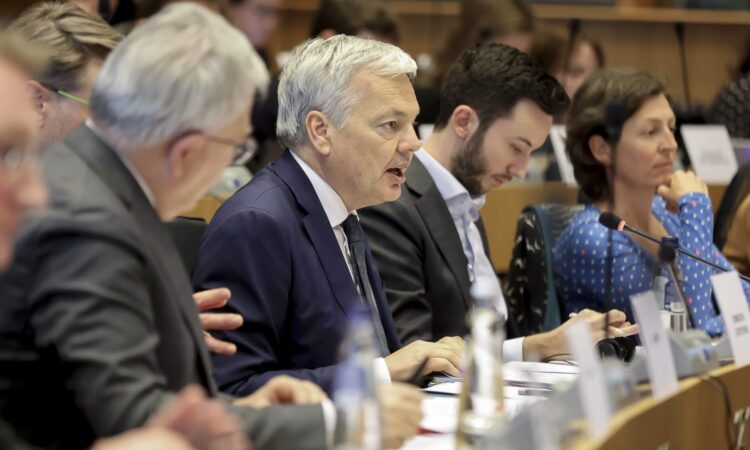European Commission Regrets Being “Legally Obliged” To Unblock Some Hungarian Funds ━ The European Conservative

Leftist and center-right MEPs have demonstrated once again that the EU’s rule-of-law dispute with Hungary is, at its core, a political witch hunt. This became obvious during a hearing Wednesday, when MEPs directly challenged the EU’s own rules in order to keep Hungary’s funds away from the country’s conservative government and its people.
While Hungary’s Fidesz government has always said the reforms to the judicial system were unnecessary but could be adopted nevertheless, it takes a different approach to the clearly political demands that it must submit to progressive policies on migration and gender law—refusing to give in to what it sees as Brussels’ “ideological blackmail.”
In the joint parliamentary hearing organized by its budgetary committee (BUDG) and the budgetary control committee (CONT), Commission representatives had to, once again, defend their decision to unblock a very small portion of Hungary’s frozen EU funds—a part conditioned on judicial reform. So far, the country has received only €445 million.
The commissioners explained that this decision does not mean the direct and automatic disbursement of the unblocked €10.2 billion, but merely gives Hungary the option to request reimbursement for projects that have been already implemented from the fund.
Hungarian MEP Andor Deli (Fidesz) recalled Commission President Ursula von der Leyen saying in last week’s plenary session that Hungary won’t get the remainder of its frozen funds “until it changes its stance on migration and gender policy.” Not that this surprised anyone, Deli added.
To be honest, for us, it was very clear from the start that the whole conditionality procedure is submitted to achieving certain ideological agendas and political goals.
“But there’s hope,” the MEP went on, now addressing his colleagues. “By looking at the satisfaction of citizens in Germany, France, and elsewhere, it seems that this House may become a different place after the [June] elections.”
Before that change happens, however, Leftist MEPs want the Commission to keep punishing Hungary by withholding its funds until all the EU’s ‘issues’ with the conservative government’s policies have been addressed.
Justice Commissioner Didier Reynders stressed several times in the hearing that Hungary has met all the EU-required conditions to strengthen judicial independence in the country, which meant there was now a strict “legal obligation” on the Commission to release a third of the frozen €30 billion of EU funds.
Reynders and Social Rights Commissioner Nicolas Schmit repeatedly explained that, since different portions were blocked through different regulations, each with their own set of criteria, the law doesn’t allow Brussels to simply link the regulations together whenever it wants to.
The commissioners did not appear pleased to have been obligated to release the money owed.
“Since Hungary undertook all the reform requests [on judicial independence], it was not possible to adopt a negative decision” on disbursing the corresponding €10.2 billion, Reynders told the frustrated parliamentarians.
MEPs also accused the Commission of “conspiring” with Budapest and selling its positive assessment in exchange for PM Orbán lifting his veto on EU budget expansion and funds for Ukraine, just because the decision to unlock the money was made a day before the December European Council summit.
“The timetable for that decision was determined by the need to respect the legal deadline,” Reynders said, explaining that Hungary submitted its self-assessment in the summer, which gave plenty of time for the Commission to assess the reforms by itself. The law indeed gave the Commission nine days to make an official decision after Budapest submitted its request for the funds on December 13th, but the delay would have made no difference in the outcome.
Ultimately personifying the Commission’s innate reluctance to release money legally owed Hungary, Schmit said that, in the end, the law left them no choice: “When we had exhausted all our possibilities in terms of content and in terms of timing, there was no scope for any negative decisions, the College [of Commissioners] had the legal obligation to take the decision we finally took,” Schmit assented.
Naturally, these technical explanations were not enough for the most militant anti-Hungary MEPs, who kept asking whether the release of funds was a “political deal to get rid of Orbán’s veto” in the Council.
“I guess, ultimately, that question will be determined by the European Court of Justice,” Green MEP Daniel Freund asserted, referencing a motion in the plenary last week that threatened the Commission with a lawsuit over the unblocked funds.
The Commissioners sought to placate the hostile MEPS by stressing judicial independence is just one of the four main issues related to the funds. The other €20 billion—tied to alleged violations of asylum procedures, gender rights, and academic freedom—remains frozen, and (at least in the case of the former two) Budapest has shown no willingness to repeal certain laws or implement progressive reforms.
In a recent interview with The European Conservative, Fidesz MEP Balázs Hidvéghi set out Hungary’s position in the ongoing debate about the remaining frozen funds. As Hidveghi told us:
Clearly, [gender and migration requirements] are positions that we’re not going to be able to make a compromise on. … No EU money is more valuable than to protect our children from LGBTI propaganda and to protect our national identity from illegal migration.






